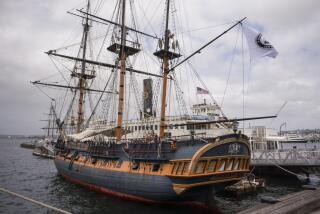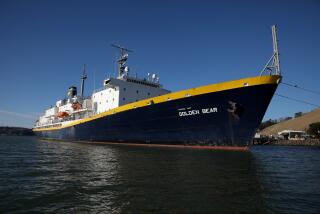Crusade for non-sexist language may be foundering on the question of whether sea and ships are female
- Share via
Despite the objections of certain educators and feminists, most of my readers seem to agree with me that ships are shes.
In the hope of eliminating “sexist language,” the Project on the Status of Education of Women, which is run by the Assn. of American Colleges, has published a four-page guide for writers.
It recommends, among other absurdities, waitperson for waitress , fair play for sportsmanship and handmade for manufactured .
It states that “nations, battleships, gas tanks and other objects have no gender.”
The careful writer, therefore, may not refer to “Italy and her history,” or call a battleship she, or say, of a gas tank, “Fill ‘er up.”
Obviously, since ships have no gender, one may not call a ship’s first trip her (excuse me--its) maiden voyage .
Among others who questioned these rulings was Don Freeman, who writes a column for the San Diego Union.
Curious about the injunction that ships have no gender, Freeman telephoned the U.S. Naval Academy at Annapolis and talked to Jim Kiser, who identified himself as a “public affairs spokesman” (rather than a spokesperson), which was a strike against him right off.
Freeman asked him if ships in the Navy were still called she.
“He said he would ask a higher authority,” Freeman wrote, “and call me back. Which he did.”
What Kiser told Freeman was that midshipmen at Annapolis are taught to say, “She’s a fine ship,” or “Bring her about,” and so on.
Kiser also explained, Freeman said, that women undergraduates at the academy are called midshipmen, not midshipwomen or midshippersons.
Some time ago, while writing in objection to the person izing of the language in the alleged interest of equality for women, I myself telephoned the academy and asked how the young women were accommodating to the Navy’s ruling that they should be called midshipmen.
I talked to a public affairs spokeswoman, who told me that the women didn’t seem to have any problem at all with being called midshipmen, and that in fact a woman had been the top midshipman in the previous semester.
Meanwhile, Jim Robinson of San Diego, a Latin teacher at Madison High School, observes that manufacture , like manual , manubrium and manumit , has nothing to do with man . Rather it comes from the Latin words manus , meaning hand , and facere , meaning to make .
So the idea that manufacture is a sexist word is even more ridiculous than the objection to maiden voyage .
On the gender of ships, Richard E. Brown of Bakersfield writes that although the British and the Germans consider ships feminine, the French consider them masculine. In matters of style, the French are usually different.
M. R. Menzies notes a paradox in the term man-of-war , for a warship, which still is given the feminine pronoun.
Quoting from memory, Menzies shows that even Longfellow recognized this:
Just as the moon rose over the bay,
There swinging wide at her moorings lay
The Somerset, British man-of-war .
The problem is even more acute when the man-of-war has a masculine name, like the British battleship Prince of Wales, which was sunk by Japanese aircraft off Malaya on Dec. 10, 1941. I have an idea that her crew called her she .
Astrid Ramsey of Simi Valley, a Briton, writes that referring to ships as she is the ultimate compliment.
“There are many shipyards in my old country and I have been privileged to attend many launchings. There is nothing more thrilling than the sight of a new ship starting slowly down the slipway into the water and hearing the softly spoken words of a shipyard worker: ‘She’s on her way.’ ”
As for the gender of the sea itself, minds are divided.
W. John Valentine of Long Beach, who spent eight years on sea duty with the Navy, is convinced that the sea is masculine. “Sailors who have gone through a great storm will vouch for that.”
I’m not so sure that the sea’s capacity for violence makes it masculine. Both sexes are capable of fury.
Capt. Alan J. Reid, a Long Beach pilot, agrees with me that the sea is feminine, but for different reasons:
“My reasoning concerns the unpredictability of the oceans in general. Even with today’s vast amounts of scientific knowledge and understanding there are uncountable mysteries and everyday unexplainable happenings. Isn’t a little mystery one of the essences of femininity?
“As for ships, they are also feminine in my view, for essentially the same reasons. . . . I’ve had several hundred opportunities this year to observe and handle various ships. The one common denominator in all of them is how unpredictable they can all be to varying degrees. . . . I still feel that ships will always remain somewhat unpredictable and, hopefully, somewhat feminine. . . .”
(Note: I didn’t say that.)
Ed Shoaf, the sage of La Canada, who can come up with an apt quotation for any argument, notes that Wordsworth eloquently spoke of the sea’s femininity in this line:
The sea that bares her bosom to the moon.
Carol Lux of Santa Barbara speaks a final word in behalf of her sex:
“I really want you to know that I, a woman and not exactly a wimpy one, feel complimented that such time-honored analogies exist as ships being called her . And after reading your lovely vision of how sailors might have come to start such a tradition, I am even more flattered. . . . And I say this with utter certainty that my view is shared by masses of other women.”
Bon voyage.
More to Read
Sign up for The Wild
We’ll help you find the best places to hike, bike and run, as well as the perfect silent spots for meditation and yoga.
You may occasionally receive promotional content from the Los Angeles Times.






